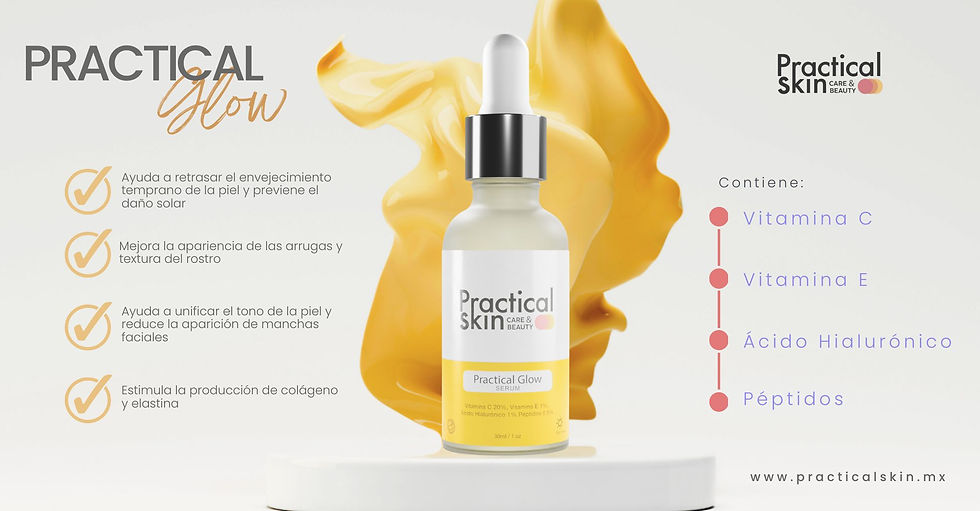Hyaluronic Acid: Anti-aging hydration
- Practical Skin

- 1 oct 2022
- 4 Min. de lectura
Actualizado: 24 oct 2022
Continuing with our list of basic effective ingredients in our skin care products, it is the turn of one of the most popular and that, without a doubt, we can find in endless products:

Hyaluronic acid is the quintessential ingredient for facial care, thanks to the fact that it is not only the best at moisturizing the skin, but also minimizes the signs of aging, since hydrated skin makes fine lines and wrinkles less visible.
Read on to learn the basics of hyaluronic acid.
source: https://www.everydayhealth.com/skin-beauty/hyaluronic-acid-definition-benefits-and-the-best-serums/

What is hyaluronic acid?
Technically, hyaluronic acid is a group of sugar molecules called polysaccharides, according to one study. These molecules function to cushion and lubricate, and are found naturally in the connective tissues of our bodies. Over time, the reserves of hyaluronic acid in our body decrease. The bad news is that not only is age one of the reasons, but environmental factors, such as smoking and air pollution, also speed up this process. The good news is that topical products that contain hyaluronic acid, whether as part of the ingredient list in a moisturizer or serum, can help rebuild those depleted stores. Hyaluronic Acid attracts and binds to water molecules and increases the water content of the skin, it can absorb more than 1000 times its weight in water.

What are the benefits of hyaluronic acid?
Hydration and anti-aging
The key benefit of hyaluronic acid is hydration and its incredible ability to retain moisture. Skin hydration is important because hydrated skin looks smoother, healthier, more vibrant and younger looking.
According to some research, skin aging is associated with skin moisture loss and hyaluronic acid is the key ingredient when it comes to combating or reversing these signs.
Thanks to its water-drawing qualities, hyaluronic acid can refine and age those dry, sunken areas.
A small study published in May 2016 in MMW Fortschritte der Medizin found that over-the-counter anti-wrinkle creams containing hyaluronic acid reduced the depth of wrinkles around the lips and eyes by 10 to 20 percent over a period of three months. Skin tightness also improved by 13 to 30 percent.
Experts recommend applying products with hyaluronic acid especially during the winter, when the skin tends to be drier. But even those who aren't struggling with dryness will want to add hyaluronic acid to their skincare routine.
The 3 types of hyaluronic acid:
Hydrolyzed hyaluronic acid is hyaluronic acid that has been broken down into elements small enough to penetrate the skin. It is hydrating, but not the most hydrating option, so it is best for people who have oily or combination skin, as this type of skin wants to avoid excessive hydration.
Sodium hyaluronate penetrates deeper into the skin and gives even better results, although the effects are not long lasting. Sodium hyaluronate is best for people with normal skin, because it will allow moisture to seep in, but you don't really need an intense, long-lasting effect. This is the ingredient you will most likely find in serums.
Sodium Acetylated Hyaluronate has the benefits of sodium hyaluronate but with longer lasting results. It's best for people who need hydration, such as those with dry skin, those who live in dry climates, or those looking for a product for the dry winter months.
There is also ingestible hyaluronic acid, which is a capsule filled with the active ingredient. The idea is that by taking a supplement, the levels of hyaluronic acid remain constant

Does hyaluronic acid have any side effects?
Hyaluronic acid is generally safe for all skin types and does not typically cause adverse reactions when applied topically.
Hyaluronic acid is a natural substance in our skin and as a result, one should not expect any problems.
According to specialized dermatologists, when patients complain of rashes or other problems related to products containing hyaluronic acid, it is often due to a problem with another ingredient, such as one of the preservatives. Preservatives extend the life of a product, but some, including parabens, formaldehyde releases, and isothiazolinones, could cause irritation.
Use of hyaluronic acid in a topical product
Currently, in most products of the skincare line we will find hyaluronic acid:
serums
Sheet masks
Eye creams
Moisturizers
Cleaners
Lip treatments
Before buying a product, follow the following recommendations:
Choose hyaluronic acid products that also include vitamin C as an ingredient, as the two ingredients work together to increase effectiveness.
Does it contain alcohol? Alcohol can counteract the moisturizing benefits of the ingredient. Isopropyl alcohol is very drying and can leave the skin vulnerable to cracking, allowing the skin to break and potentially getting irritants and bacteria where they don't belong.
Avoid fragrance. Fragrance can also cause contact dermatitis, which is a skin rash that can appear minutes or days after contact with a trigger.
Trust the water. You will often notice that water is the first ingredient in hyaluronic acid products. It may seem like a useless ingredient, like it's diluting the product, but it actually helps make the hyaluronic acid more effective. Having a more water-based product, rather than a cream, oil, or gel, will allow the product to penetrate the skin more easily.
As you can see, hyaluronic acid is an essential ingredient in your skincare routine, since keeping your facial skin hydrated is key to preventing signs of aging.
Practical Skin offers you facial serums with hyaluronic acid
Morning serum:

Night serum:

Remember that you don't need to go to the extreme... you just need to be consistent.
Thank you for reading us Did you like our information? Share our content






Comentarios